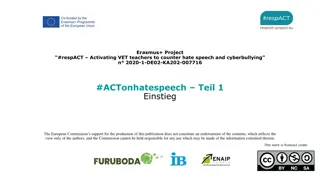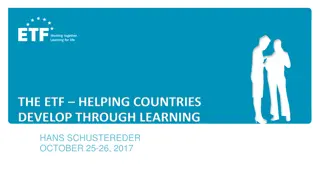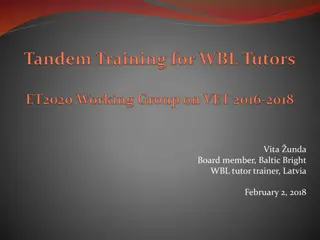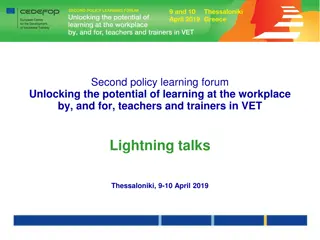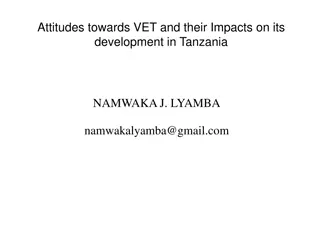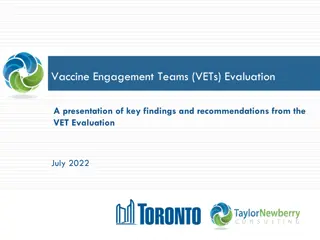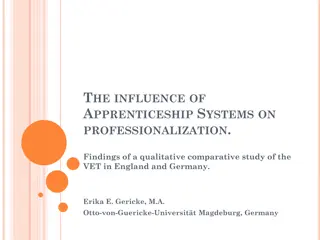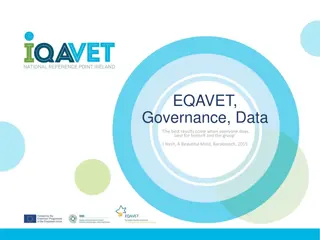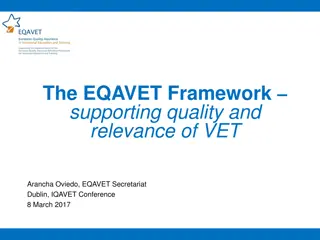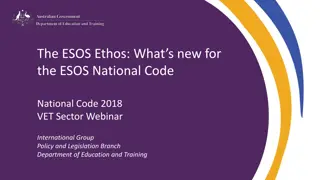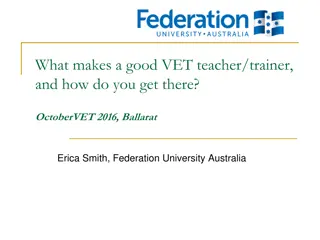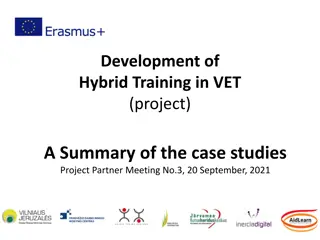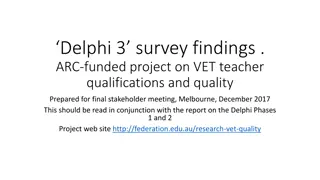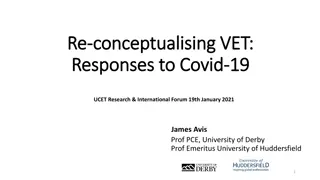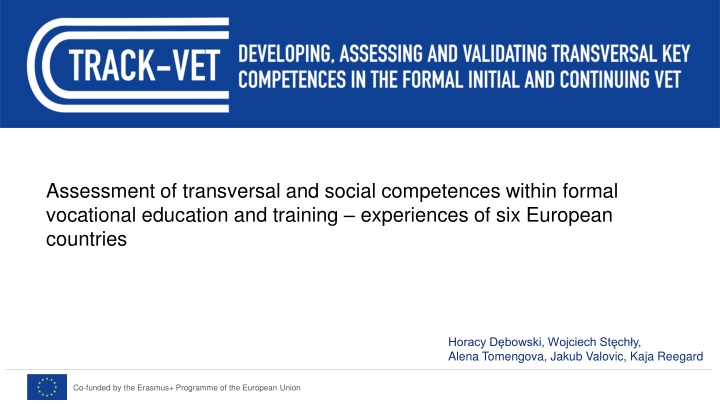
Assessment and Development of Transversal Key Competences in Vocational Education
Explore the assessment and development of transversal key competences in formal vocational education across six European countries. The project delves into definitions, learning outcomes, assessment strategies, and conclusions related to key competences essential for lifelong learning. Discover how the TRACK-VET project proposes to enhance personal, social, civic, entrepreneurship, and cultural competences among learners.
Download Presentation

Please find below an Image/Link to download the presentation.
The content on the website is provided AS IS for your information and personal use only. It may not be sold, licensed, or shared on other websites without obtaining consent from the author. If you encounter any issues during the download, it is possible that the publisher has removed the file from their server.
You are allowed to download the files provided on this website for personal or commercial use, subject to the condition that they are used lawfully. All files are the property of their respective owners.
The content on the website is provided AS IS for your information and personal use only. It may not be sold, licensed, or shared on other websites without obtaining consent from the author.
E N D
Presentation Transcript
Assessment of transversal and social competences within formal vocational education and training experiences of six European countries Horacy D bowski, Wojciech St ch y, Alena Tomengova, Jakub Valovic, Kaja Reegard Co-funded by the Erasmus+ Programme of the European Union
Plan of the presentation: 1. Definitions & concepts 2. Solutions regarding formulation of learning outcomes 3. Development of TKC outcomes of the country reports 4. Solution regarding assessment 5. Conclusions Co-funded by the Erasmus+ Programme of the European Union
Part I Definitions & concepts Co-funded by the Erasmus+ Programme of the European Union
In the TRACK-VET project proposal we decided to use the term transversal key competences (TKC), which is defined as a subgroup of the 8 key competences defined in the Council Recommendation on Key Competences for Lifelong Learning (2018), namely: - Personal, social and learning competence - Civic competences - Entrepreneurship competence - Cultural awareness and expression competence Co-funded by the Erasmus+ Programme of the European Union
Development of transversal key competences Development of TKC is understood as the intentional process of forming competences. This process might be defined in the curricula, programmes or other documents. In many instances competences are being developed freely, sometimes unintentionally. We did not aim to investigate these aspects in detail, because of the systemic focus of the project Co-funded by the Erasmus+ Programme of the European Union
Assessment of transversal key competences Assessment means, methods and processes used to establish the extent to which a learner has in fact attained particular knowledge, skills and competence . In this sense assessment is similar concept to the concept of examination . We adopted the approach and definition of assessment from the ECVET Recommendation 2009. Co-funded by the Erasmus+ Programme of the European Union
Formal initial and continuous VET system We proposed to define formal initial and continuous VET, as systems that have some or all of the below characteristics: - based on core-curriculum or national qualification (standard); - lead to state recognised (and very often state examined and quality assured) qualifications; - be funded by the state (at least partially); - is not part of 1st or 2nd cycle in higher education. Co-funded by the Erasmus+ Programme of the European Union
Part II The learning outcomes descriptions - how are TKCs being modelled in educational documents? Co-funded by the Erasmus+ Programme of the European Union
Research questions: - Where are TKCs to be found in educational documentation? - What is the scope of their representation? - How are they being described/formulated? Who is responsible for the description of TKCs in documentation? - Are NQF level descriptors taken into account when designing the descriptions/requirements? Co-funded by the Erasmus+ Programme of the European Union
Findings: - We identified different models of embedding TKCs in VET - Uneven distribution: some TKCs are much less frequently mentioned in documents - Descriptions are often vague and reduce TKCs to the knowledge domain - Mixed evidence of influence of qualifications frameworks on supporting TKCs development Co-funded by the Erasmus+ Programme of the European Union
Outcomes of the quantitative analysis (1): Co-funded by the Erasmus+ Programme of the European Union
Outcomes of the quantitative analysis (2): Co-funded by the Erasmus+ Programme of the European Union
Models of formulation LO (1): Model 1. The strong conceptual point of reference example of BIST educational standards (Bildungstandards) in Austria Co-funded by the Erasmus+ Programme of the European Union
Models of formulation LO (2): Model 2. The multilateral network of categories example of France Co-funded by the Erasmus+ Programme of the European Union
Models of formulation LO (3): Model 3. TKC s unitised example of Poland and Latvia Co-funded by the Erasmus+ Programme of the European Union
Examples of TKCs presented in the report: Co-funded by the Erasmus+ Programme of the European Union
Part III Development of TKC presentation of the main conclusions from the country reports Co-funded by the Erasmus+ Programme of the European Union
TKC development in IVET and CVET Responsibility of teachers, trainers, tutors, co-workers Places for competence development: schools, work-places in school settings or enterprises TKC development is not possible if old fashion teaching methods and strategies are applied Transmissive teaching does not allow the key competence development, especially TKC Co-funded by the Erasmus+ Programme of the European Union
Professional Development of Teachers, Trainers, Tutors (1) Professionalism has been associated with pedagogical and subject knowledge, commitment to serving students needs, strong individual and collective identities and professional autonomy Training and Education: and attitudes and improve job performance in a direct way; education is to impart knowledge and develop cognitive abilities applicable to all important life-situations (Brundrett and Silcock 2002) training endeavours to impart knowledge, skills Co-funded by the Erasmus+ Programme of the European Union
Professional Development of Teachers, Trainers, Tutors (2) Continuing professional development: retooling(ideas, knowledge and techniques learned can be immediately applied to the classroom), remodelling (modifying existing practises to ensure that teachers are compliant with government change agendas), revitalising (focus is upon teacher renewal, providing opportunities for teachers to reflect upon why they came into teaching in the first place, and examining beliefs and practises through professional development networks, or participation in practise-based enquiries; reimagining(development of teacher s critical and transformative capacities ). Judyth Sachs (2011) Co-funded by the Erasmus+ Programme of the European Union
TKC are developed if: the learning goals are clear, the learning contents relevant, the training includes practice with feedback, behavioural modelling and error-based examples, the work environment is friendly and safe. Co-funded by the Erasmus+ Programme of the European Union
Strategies for competence development in IVET and CVET supported by active deep learning situated learning in real- life work situations project - based learning creation of portfolio Co-funded by the Erasmus+ Programme of the European Union
Deep learning supports to acquire domain specific knowledge and development of domain-specific skills. While deep learners acquire the skills in a concrete task, they build at the same time the competence to transfer these skills to another situation. (N gele & Stalder 2017) Co-funded by the Erasmus+ Programme of the European Union
Situated learning has been defined as a learner executing tasks and solving problems in an environment which reveals the various intended uses of the knowledge. (Brown, 1989). For situated learning to be effective it needs to be embedded in the authentic activities and social relations which comprise cultural practice. The learning activities which fail to access and engage in a culture of practice are less likely to be generative of effective learning outcomes. This does not exclude instructional interludes to deepen an understanding of vocational activities (Billett,1994). Co-funded by the Erasmus+ Programme of the European Union
Project based learning is a dynamic classroom approach in which students actively explore real-world problems and challenges and acquire a deeper knowledge (in-depth exploration of a topic, real-life experiences, give students voice and choice, share their work and develop communication, application of problem-solving, creativity and critical thinking development) Co-funded by the Erasmus+ Programme of the European Union
Key competence development some resources School Education Gateway Publications, Tutorials, Teaching Materials Europe's online platform for school education Available online: https://www.schooleducationgateway.eu/en/pub/latest/news/key-competence- development.htm https://arpdcresources.ca/consortia/learning-through-competencies/ Competence learning guides Co-funded by the Erasmus+ Programme of the European Union
Part IV Assessment of transversal key competence How are TKCs assessed? Co-funded by the Erasmus+ Programme of the European Union
1. Transversal key competences are being assessed only to a very limited extend, mostly during continous assessment conducted by teachers. Assessment of TKCs are apart from some cases are almost non existent within the assessment leading to a certification 2. Continous assessment conducted while learning at school has mostly summative character. Summative assessment still is the dominant form of assessment in schools when it comes to the determination of grades Co-funded by the Erasmus+ Programme of the European Union
3. Identified good practices: - project based assessment introduced by Austria - portfolio method, including e-portfolio introduced by France - social project intiative developed by the Zwolnieni z teorii project in Poland Co-funded by the Erasmus+ Programme of the European Union
Part V Main conclusions and recommendations (based on interviews, analysis of documents, literature review) Co-funded by the Erasmus+ Programme of the European Union
1. Would descriptive categories related to competences defined in the Council of the EU adopted on key competences for lifelong learning (2018) be a useful platform in discussion between partners Answer: yes Comment: for the purpose of estabilishing a common understanding and preparing country reports TRACK-VET transversal key competences had to be operationalised Co-funded by the Erasmus+ Programme of the European Union
2. Is differentiation between professional / task specific skills and transversal (or social, or any other subcategory) competences needed. Answer: yes Comments: differentiation between professional / task specific skills and transversal (or social, or any other sub category) competences creates a false dichotomy - it is an analytical concept used to describe similar aspects of human capabilities observed in varying situations. As it turns out not using these artificial categories may in some cases (e.g. time limitation and assessment focus on specific skills) lead to incomplete development of the relevant competencies. This is especially relevant for countries in which the different concepts of competence are less used / developed. Co-funded by the Erasmus+ Programme of the European Union
3. Should TKCs (including social competences) be developed within formal vocational education? Answer: yes. Formal VET should be contributing more strongly to challenges appearing currently in European socities (immigration, radicalisation of views, developments on the labour markets). Comment: this is quite well reflected in the strategic documents and in VET core curricula Co-funded by the Erasmus+ Programme of the European Union
Presence of TKC in the strategic documents and core curricula Personal, competences learning competence social and Civic competences Entrepreneurship competence Cultural awareness and expression competence Austria X X X X France X X X X Latvia X X X X Norway X X X X Poland X X X X Slovakia X X X X Co-funded by the Erasmus+ Programme of the European Union
Austria fragments of the VET curricula: Students have the competence to: - deal with religions, cultures and ideologies, to take part in cultural life and to show understanding and respect for others - to deal with the essential question, with ethical and moral values as well as with the religious dimensions of life - to effectuate lifelong learning as immanent part of life- planning and career management Austrian country report Co-funded by the Erasmus+ Programme of the European Union
Latvia fragments of the VET strategic documents: to ensure a student with the knowledge and skills necessary for personal growth and development, civil participation, employment, social integration and continuation of education ; to promote the improvement of a student as a mentally, emotionally and physically developed personality and to develop habits of healthy lifestyle ; to promote a socially active attitude of the student, retaining and developing his or her language, ethnical and cultural particularity, as well as to improve understanding regarding the basic principles of human rights included in the Constitution of the Republic of Latvia and other legal acts to develop the student s ability to learn and improve independently, to motivate him or her for lifelong learning and an informed career . (Section 2, Regulations Regarding the State General Secondary Education Standard, Subject Standards and Sample Education programs, Cabinet Regulations No 281, 21.05.2013) Latvian country report Co-funded by the Erasmus+ Programme of the European Union
Reservation: - the programme documents do not provide a representation of school reality - realization of the policy-makers vision is formally expected of school principals and teachers, however the vision may be interpreted and implemented in different ways this is especially relevant for transversal key competences Co-funded by the Erasmus+ Programme of the European Union
4. Should TKC be asssessed within formal VET? (1) With regards to formative assessment answer is yes With regards to assessment for licensure - no conclusive answer Based on the analysis of the six countries experiences we do not know, if this is desirable or even possible Further analysis is needed in each case weighting the risks of reductionism ( dumbing down ), the need for elastic approach for groups and individuals and the benefits of using summative assessment and gathering experiences (experimenting) would be required. Co-funded by the Erasmus+ Programme of the European Union
4. Should TKC be asssessed within formal VET? (2) There is no formal or standalone assessment of TKCs in any of the participating countries. Continuous assessment is in TRACK-VET project countries largely left on the discretion of teachers But leaving aside TKC outside assessment for licensure is considered in some countries as a danger. Co-funded by the Erasmus+ Programme of the European Union
4. Should TKC be asssessed within formal VET? (3) Assessment of TKC does not need to be incorporated into the decision what mark is assigned to the student, but maybe an oral comment on them would be of some value shifting some of the attention towards TKCs as integral part of professional skills and giving student a feedback? Co-funded by the Erasmus+ Programme of the European Union
Norway country report: In extension of this discussion we were presented with what may seem to be a dilemma: in order for TKC to be acknowledged as important in practice, it must be measurable, but if TKC is laid down in curricula in ways that make it measurable, it loses its importance as TKC. This means that it requires a reduction of TKC a type of operationalization which appears to stand in contrast to the idea of TKC Co-funded by the Erasmus+ Programme of the European Union
France country report: Generally speaking, the inspectors perceive TKCs as attitudes or behaviours which are not necessarily very objectifiable and therefore difficult to assess, except perhaps in the workplace. From this perspective, for some of them, periods of workplace training would be an appropriate situation for assessing these types of competence. Co-funded by the Erasmus+ Programme of the European Union
5. Should TKC assessed within assessment for licensure, even to limited extent? No conclusive answer Comment: Interviewed experts within countries had different views whether assessment in limited scope, should be done or not. Examples of what limited extent might stand for just knowledge , skills not attitudes , observable behaviours in group work . Co-funded by the Erasmus+ Programme of the European Union
6. The role of employers Consensus within all country experts: employers should be involved in development of TKC No workplace socialisation without employers involvement. But the role of employers is much wider. According to some expert employers are better equipped to assess TKCs. Co-funded by the Erasmus+ Programme of the European Union

